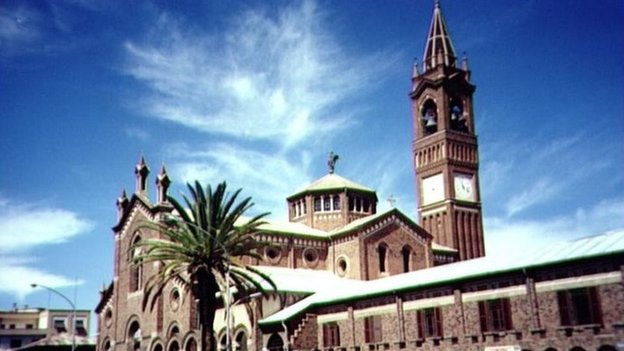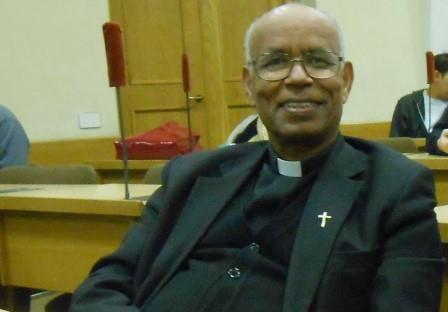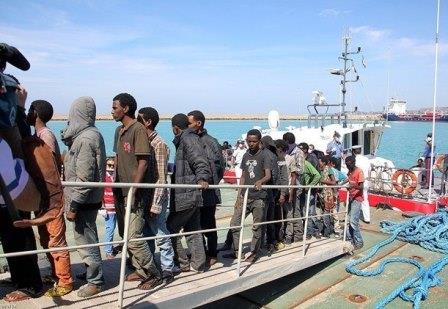Daniel Comboni
Misioneros Combonianos
Área institucional
Otros links
Newsletter
Monday, June 30, 2014
Sebhatleab Ayele Tesemma, a Eritrean Comboni missionary presently working in Uganda, made some remarks and comments, which we publish below, on the implications – within and outside the country – of the Pastoral Letter that begins with the question “Where is your brother?”, written by the Catholic Bishops of Eritrea. “It is not the first pastoral letter of the Eritrean Catholic Bishops. It is neither the first time that the bishops are expressing their concern to the civil, religious and political leaders of the country”, wrote the missionary.
In the picture above: St. Joseph’s Cathedral in the centre of the city of Asmara. It was built in 1922 and it is now the seat of the Eparchy of Asmara.
On the right:
Bishop Mengsteab Tesfamariam,
Eparch of Asmara.
The Catholic Bishops of Eritrea wrote a bold Pastoral Letter that begins with the question “Where is your brother?”.
It was written on the occasion of the 23rd anniversary of the nation’s independence, 24th May. It was signed on the 25th of May by the four Bishops of the four Eparchies (Dioceses) of the country: Bishop Menghesteab Tesfamariam (Asmara), Bishop Kidane Yebio (Keren), Bishop Thomas Osman (Barentu) and Bishop Fikremariam Hagos (Segheneiti).
Some of the Eritrean opposition website commented that it was the most “daring” letter that ccane from inside the country. The world knows that the regime of Isayas Afeworki silenced all the voices by closing all private media and scrubbing freedom of expression, of religion and association. Indeed, the timing and the audacious voice of the Catholic Bishops caught everybody by surprise, including to the regime itself.
Eritrean migrants
intercepted
in the Mediterranean.
Title borrowed from Pope Francis
The title of the pastoral letter, “Where is your brother?” (Gn 4:9) was borrowed from the statement made by Pope Francis when he visited Lampedusa, Southern Italy, in September last year, when more than 500 Eritrean immigrants perished in the Mediterranean while trying to cross the sea. The Pope asked the few Eritrean survivors, who were present at the Eucharistic celebration “Where is your brother? Who will cry for him? Who will pray for him? Let me cry and pray for him”. And he actually cried and prayed touching the hearts of the survivors and many other present at the occasion.
“Where is your brother?” is not the first pastoral letter of the Eritrean Catholic Bishops. It is neither the first time that the bishops are expressing their concerns to the civil, religious and political leaders of the country. Since the Independence of Eritrea in 1991, this is the third pastoral letter that the Catholic Bishops have written. The first was on the occasion of the first independence anniversary with the title “Peace and Progress”. The second, “God loves this country”, was written in 2001 when the government closed all private media outlets and imprisoned all opposition forces that resisted the dictatorial trend of Isayas Afeworki.
The 36 page pastoral letter carries numerous biblical and Church documents’ quotations. Practically every statement of the bishops is substantiated by a quotation. It is addressed to “all the Catholic faithful and people of good will”: “God’s question ‘Where is your brother?’ (Gn 4:9) is asked of each of us. And so we write you this Pastoral Letter with the intention of sharing the burden of the problems and sufferings of our brothers” (No 4). The letter makes comprehensive and meticulous analysis of the tragic situation of the country in all sectors of life. It got extensive coverage in all news agencies including the major ones like BBC, CNN, Al Jazeera and others. It came when the Eritrean crisis is at its peak and when the regime is described by many observers as the “North Korea of Africa”.
Part one: Demands and obligations of a mature Christian
“Where is your brother?” carries three parts. Part I links the conclusion of the “Year of Faith” with the demands and obligation of a mature Christian faith. The Bishops express their pastoral and spiritual obligation in front of the crisis of Eritrea: “The Church as a whole and all her Pastors, like Christ, must set out to lead people out of the desert” (No 1). Quoting Pope Benedict’s Motu Proprio, Porta Fidei they say “So we too, the Pastors of the Church of God in Eritrea, feel the duty to be vigilant so that … no one should become lazy in the faith” (PF, 15). The contents of the letter are put within the framework of faith and hope that always offers solutions (Jn 14:6). The analysis of the current situation is done from the perspective of Christian faith and its obligations to find solutions to the multiple hardships that the nation is undergoing. Hence, “Where is your brother?” becomes an urgent call from God to all the Catholic faithful and people of good will. It also presupposes that one should put aside selfish interests to take care of his ‘brother” and “sister” who is in desperate socio-political situation.
Part two: Analysis of all the hardships of the people
The main body of “Where is your brother?” is in Part II whereby the bishops analyze all the hardships of the people without leaving a stone unturned. They start right away with the Lampedusa tragedy: “Our country and people were struck by a tragedy that shook even the outside world: the drowning of hundreds of our young countrymen in the waters of the Mediterranean Sea. This was the climax of an odyssey that has been going on for years over mountains, rivers, deserts and seas at the mercy of criminal human traffickers”. The Bishops say the root cause of the mass exodus from the country is the “absurd situation of neither peace nor war”. According to the UN special Rapporteur on Eritrea, Sheila Keetharuth, since January alone some 13,000 Eritreans have arrived in Italy by boat. This is an independent report that was released on June 19th, a month after the pastoral letter of the Bishops. That explains why the bishops say “We are terrorized by the prospect of a ‘Drastic Depopulation’ of the country”. The Bishops decry that the country is becoming “desolate” because the young and middle age generation have no alternative for self-fulfillment except looking to distant lands. The obvious result of the non-achievement one’s own aspirations is bringing a growing number of people to frustration and desperation. The Bishops implore everybody: “We need to run to the shelters with courage and creativity to stop those who have not yet left and to call back those who have already gone”. They say the solution is to explore ways and means that allow the country to offer the citizen a true and effective possibility for self-fulfillment. They also ask “So, what is missing? Is it political will or the lack of an actual possibility of bringing it to an end?”. Quoting their previous letter, the bishops say “Why are our youth choosing to go abroad? For no one leaves a country of milk and honey to seek another country offering the same opportunities” (God loves this Country, 29).
Another catastrophe besieging the country is the ‘Disintegration of the Family Unit’, not only by mass exodus but also by the infamous military service and ridiculous massive imprisonment. The pastoral letter openly deplores: “The imprisonment of many young people in actual prison or in punishment camps is exposing to misery not only the elderly parents with no visible means of support, but also entire families and it is having serious consequences at the economic level as well as at the psychological and mental levels”. Due to this awkward condition, the cultural values and norms that hold the family are in the process of extinction. This yet is another social sector that needs urgent attention.
The courage of the Bishops is more noticeable whey they denounce the absence of the “Rule of Law”. As some observers say this might be the section of the pastoral letter that will most irritate the regime of Isayas Afeworki. In the following statement the Bishops spell out issues that nobody inside the country has ever had the courage to do.
“Since the principle of lawfulness cannot be set aside from any project for moral and social reconstruction, one can never finish insisting on its importance. In treating someone accused of an offence, justice cannot and must not be disassociated from humanity and compassion.
Every legal case must be lawfully based on this premise, reasoned according to the proper procedures and brought to its conclusion at the right time. More generally, the engaging of the principle of constitutionality, a demand acutely understood and pressingly invoked by whoever appreciates the value of justice and liberty, can no longer be disregarded.
Within this same issue there is also the question of the actual absence of an open discussion of the problems of the country, of mature and dispassionate dialogue, of access to objective and verifiable information” (No 23).
Others grievance portrayed in the Pastoral letter are education, economic crisis, moral/spiritual life and roots of evil. On the economic despair the bishops list the evident causes: “the exorbitant prices of consumer goods, the absolute insufficiency of salaries, the unstoppable climbing of rents, the prolonged block on building, the impossibility of dedicating oneself to the work of one’s choice, etc.” (No 25). As stated above, all the declarations are based on Biblical and Church documents’ foundation.
Part three: The importance of Christian witness
“Where is your brother?” concludes with a third part, entitled “Witness”, whereby the bishops urge all believers to face the situation with renewed faith and act accordingly. They desire to see once again that faith is a light; because if faith dies out, all other aspects of life become daze. They recall the messengers of God who brought faith to Eritrea: “We, too, are called to insert ourselves into this current of life and witness. Replying to the same call, the first Proclaimers of the Gospel in our land, St. Frumentius and the nine Roman Saints and, in more recent times, St. Giustino de Jacobis and the missionaries of successive decades, have revived and revitalized the ancient flame of faith”.
“Where is your brother?” has widespread support and divulgation from Eritreans of all denomination both inside and outside the country. Obviously those inside the country cannot express openly their support. Everyone is waiting with ‘suspended breath’ the reaction of the regime. Some say the government will not take any action for fear of further worsening its already damaged image. Others say it may persecute the Catholic Church indirectly by character assassination on the individual bishops. Whatever the case, “Where is your brother?” is out ‘loud and clear’. As Jesus said “He who has ears to hear let him hear!” (Mt 11: 15).
Fr. Sebhatleab Ayele Tesemma






